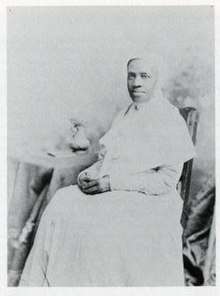Rebecca Cox Jackson
Rebecca Cox Jackson (1795–1871) was a free Black woman, best known for her religious activism and for her autobiography.
Biography
Rebecca Cox was born on February 15, 1795 in Hornstown, Pennsylvania[1] into a free family.[2] She married Samuel S. Jackson and worked as a seamstress until she had a religious awakening during a thunderstorm in 1830. She began preaching in her community and attained a following of men and women, and criticism of established churches. She got divorced after her husband failed to teach her to read and write, and later realized she was able to do both anyway.[2] Around this time she met her lifelong companion Rebecca Perot. Both women continued to have visions, even appearing in each other's visions. Perot said in one of her visions that Jackson was "crowned King and me crowned Queen of Africa," while Jackson saw the two of them "unit[ing] in the covenant." The two women were together for thirty-five years, until Jackson's death.[3]

While traveling from church to church, she came upon and decided to join the Shakers in Watervliet, New York.[2] She became a minister in that community, but left with Perot after experiencing racial discrimination.[3] Jackson and Perot moved to Philadelphia where in 1859 Jackson established a Shaker group primarily ministering to Black women.[3][4] She and Perot went back to Watervliet for a year, and then returned to Philadelphia where Jackson continued as Eldress of her family of Shakers until her death in 1871.[2] She is buried in Eden Cemetery in Collingdale, Pennsylvania.[5] After Jackson's death, Perot took the name Rebecca Jackson, Jr., and continued in her partner's role of leader of the Shaker group.[3] The Black Shaker community in Philadelphia continued to exist as late as 1908.[2]
Her autobiography, although written between 1830 and 1864, was only published in 1981.[6]
Bibliography
- Gifts of Power:The Writings of Rebecca Jackson, Black Visionary, Shaker Eldress edited with an introduction by Jean McMahom Humez. Amherst, MA: University of Massachusetts Press, 1981.
References
- Morgan, Barbara (2000). "Jackson, Rebecca Cox (1795–1871)". Women in World History, Volume 8: Jab-Kyt. Waterford, CT: Yorkin Publications. pp. 21–22. ISBN 0-7876-4067-0.
- Africans in America/Part 3/Rebecca Cox Jackson
- Faderman, Lillian (1999). To Believe in Women: What Lesbians Have Done for America - A History. New York: Mariner Books. pp. 264–265. ISBN 0-618-05697-1.
- "Archived copy". Archived from the original on 2012-02-27. Retrieved 2012-08-20.CS1 maint: archived copy as title (link)
- "Rebecca Cox Jackson (1795-1871) - Find A Grave..." www.findagrave.com. Retrieved 2020-06-10.
- The Signifying Monkey, by Henry Louis Gates, Jr, Oxford University Press, hardcover, page 241